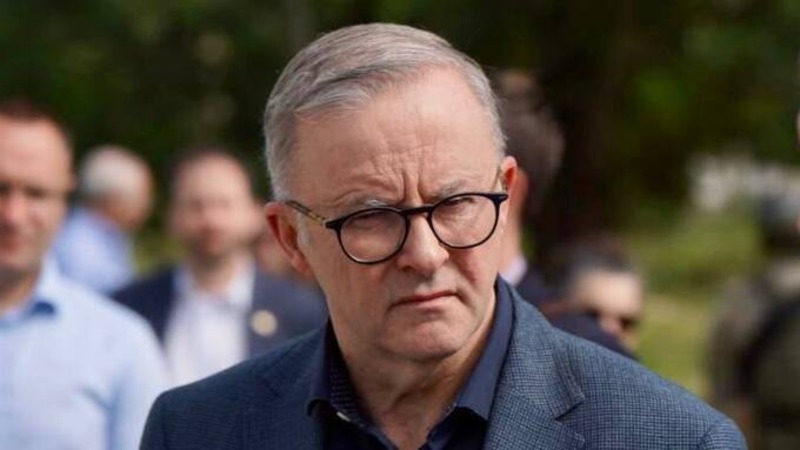How Albanese came to terms with China
November 15 2022

By Elena Collinson and James Curran
Note: This article appeared in The Australian Financial Review on November 15 2022.
Prime Minister Anthony Albanese has confirmed that he will meet Chinese President Xi Jinping on the sidelines of the G20 meeting in Bali.
The meeting will come on the heels of an informal discussion instigated by Chinese Premier Li Keqiang at the ASEAN Summit gala dinner in Cambodia on Sunday, and be the first between Australian and Chinese heads of government in five years.
But it is worth tempering any expectations that this will amount to a ‘reset’ of the relationship, full of irritants as it is. Albanese has been circumspect about China since winning office in May, saying he expected it would be a ‘problematic’ one for some time.
Nevertheless, like many of his peers, his thinking on China since entering politics represents both continuity and change. Once flush with the euphoria of engagement, at times frustrated by the easy recourse of many in the debate to slur and slogan, he too has had to adjust to the bullying and truculence of Xi’s China.
Despite an eye firmly fixed on domestic matters, Albanese has – since earlier this century – made forays into the debate over the Australia-China relationship, establishing himself as a proponent of engagement and dialogue with China, and staunchly supporting the maintenance of open lines of communication over areas of disagreement.
An occasional model
After Beijing’s verbal lashing in 2008 of Kevin Rudd for comments on human rights abuses committed by the Chinese government in Tibet, Albanese – then minister for infrastructure and transport – was restrained, noting Australia’s ‘firm position of supporting one China’ did not preclude the acknowledgement of human rights issues, saying, ‘we … want to see human rights respected and for dialogue to occur’.
Albanese opposed calls from some quarters for a political boycott of the 2008 Beijing Olympics, saying ‘if people want to see China engaging more with the world, then what better way than for the Olympics to be held there’.
He was critical of protesters who disrupted the London and Paris legs of the Olympic torch relay, expressing strong disagreement with the notion of using the Olympics as ‘a battering ram against the Chinese government’.
A year later, as China sought to invest more heavily in Australia and as a Malcolm Turnbull-led opposition sought to make political mileage out of trips to China by Labor politicians and a puzzling decision to try to keep a meeting between Rudd and China’s propaganda chief, Li Changchun, under wraps, Albanese was derisory about attempts to depict the Rudd government as too close to China. He accused the opposition of ‘ringing the old bell about the red hordes coming down’.
Albanese had also occasionally pointed to China as a model – in some limited respects – for Australia to follow. As Labor’s environment spokesman in 2006, he praised China’s renewable energy target of 15 per cent by 2020, unfavourably comparing Australia’s less expansive aims under John Howard.
And when launching an Australian cities report in November 2011 as transport minister, he cited a meeting that month with a visiting Chinese Communist Party official in which Beijing’s 12th five-year plan was discussed, expressing some admiration for the efficiency of the Chinese system.
He juxtaposed Shanghai’s plans for the completion of a second airport in four years with the announcement of a second Sydney airport by the Chifley government in 1946: ‘As someone with some tendencies towards the planning and pro-government side of politics, I had some envy.’
‘Australia is a part of Asia’
At the same event he proclaimed, ‘China’s future is in part also our future’, and picked up on the same theme in 2015 when he emphasised that ‘Australia is a part of Asia’ while criticising the Coalition for dragging its feet on joining the Asian Infrastructure Investment Bank.
Quoting Machiavelli, he told parliament that ‘tardiness often robs us of opportunity and the dispatch of our forces’, and that committing to the AIIB when the Chinese first proposed creating it was a ‘policy no-brainer’.
Albanese also commended Labor for having ‘laid the groundwork’ for Australia-China infrastructure co-operation, in particular the memorandum of understanding on closer infrastructure ties he signed with the Chinese minister for commerce in April 2012.
Like many in the political and commercial world at the time, Albanese sang the praises of benefits of Australia’s ‘enhanced relationship’ with China, resulting in two-way trade worth more than $100 billion. These were heady days.
Yet, Albanese’s support for Australian engagement with China and for strengthening economic ties between the two countries has also been balanced by regard for security considerations, not least Australia’s alliance relationship with the US.
Following Chinese company Landbridge’s successful bid to operate the Port of Darwin under a 99-year lease in October 2015, Albanese said of the deal: ‘Darwin Port is an incredibly important strategic asset for our nation and because of our arrangement with the United States for joint training in northern Australia, it is important for the US as well. And it is extraordinary that there was no heads-up given to our ally in the United States…’
He termed the deal ‘a grave error of judgement’, noting that the port ought to have been kept in Australian hands – either as a public asset or leased to ‘funds with Australian investors’, as opposed to giving it up ‘to a company that has links with the People’s Liberation Army’.
Threats real and imagined
Australia-China relations began to deteriorate in 2016 as the domestic debate on China became more heated over threats real and imagined, and with a particular focus on Chinese foreign interference and influence. But Albanese largely remained out of the fray.
In remarks in April 2018 on the kind of rhetoric beginning to characterise the China debate, he said political leaders needed to ‘give appropriate statements, whether it be about China or the US or any other nation we have an important relationship with’. It was a somewhat forlorn call for calm, for diplomacy.
Indeed, the tone and tenor of the debate seemed to get under his skin. He could sense already that discussion over how to manage a more assertive China was at times being reduced to caricature.
Just before assuming the position of opposition leader in May 2019, Albanese proffered the view that, while it must be acknowledged ‘that there are issues with China with the nature of the government that is not a democratically elected government’, he found ‘some of the commentary on China almost naive’.
Expounding on this remark, he noted ‘the suggestion that someone has had contact with people in the Chinese Communist Party in China, who does business in China, is no more shocking than someone having contact with the Liberal Party or the Labor Party here because they don’t have a separation of state and party there’. He also observed that in some instances there had been reporting that had been ‘perhaps more suited to a fictional spy movie’.
In his strongest declaration, Albanese said that it was not in Australia’s economic interest ‘to be xenophobic when it comes to China and the role of China in the region’. While there were legitimate security concerns, he said: ‘We also need to acknowledge that China has been a nation in which we have a friendly relationship and have had one since ... 1972’. He noted ‘that is part of Labor’s legacy, we will work with the region’.
A more forward-leaning posture
Yet, as newly minted opposition leader, Albanese kept his head well below the parapet. Throughout much of 2019 and most of 2020, he left the question of Labor’s position on China to foreign spokeswoman Penny Wong. Mostly, he murmured assent with Coalition policy when pressed. No defence was forthcoming of three Chinese-Australians who were questioned about their political loyalties by then-Liberal senator Eric Abetz during an inquiry into issues facing diaspora communities in October 2020.
However, the same month did mark the start of a more forward-leaning posture by Albanese on the Morrison government’s China policy, declaring the government needed to ‘be more strategic and less political in some of its rhetoric’, and asserting that ‘this government doesn’t seem to have made any effort to have a positive, constructive relationship to our mutual benefit’, which was a ‘real concern’.
By the end of 2020, he concluded that the government seemed to have ‘presided over a complete breakdown of relationships’, but without any elucidation of what an optimal alternative strategy on China might look like.
By this time, China had targeted multiple Australian exports for trade punishment, slapping an 80.5 per cent tariff on barley, suspending beef exports from six abattoirs, issuing alerts to students planning to study in Australia, and verbally instructing power stations and steel mills in China to stop using Australian coal, and ports to stop offloading Australian coal.
Chinese authorities also discouraged Chinese spinning mills from using Australian cotton, delayed imports of live lobster, suspended timber exports from various states, and imposed a countervailing duty deposit on wine. More, of course, was to follow.
Getting on the front foot
Albanese did, however, look to get on the front foot. His answer to the deterioration in relations was to send a high profile, bipartisan pair of envoys to China to try to heal the rift. At the beginning of 2021, as China’s trade punishment of Australia intensified, Albanese wrote to prime minister Scott Morrison suggesting that Canberra ‘use all assets at its disposal to move the relationship in a more positive direction’.
He proposed that an offer of personal diplomacy by former Australian political leaders Kevin Rudd and John Howard ‘could assist the government to reset the relationship and to help secure our export markets’. He made sure to add in during a subsequent press conference: ‘To be clear, it is China that is to blame for breaking down that relationship’ – a refrain that has continued into his prime ministership – ‘but you need to find a way through.’
In June 2021, Albanese finally addressed what Labor would do differently regarding Australia’s relationship with China. It would follow the lead of the Biden White House. Albanese said that a Labor government would ‘engage, consistent with the position of the Biden administration that speaks about competition without catastrophe and a return to diplomacy’.
He noted there was no disagreement between Labor and the government when it came to substantive issues on China, pointing to examples such as the South China Sea and the Huawei 5G ban. Asked what ‘the right way to do diplomacy’ is, he pointed to Australia’s historical approach under governments spanning Howard to Tony Abbott, as well as Tokyo’s approach to Beijing.
This would effectively form the foundation of Albanese’s China policy mantra, carrying through to the federal election campaign and into his prime ministership.
When Albanese does sit down with Xi in Bali, it will underline the import of his expressed desire to ‘find a way through’. That may not result in the removal of China’s economic sanctions, or the release of detained Australian citizens Cheng Lei or Yang Hengjun. But it will be a start.
It will prove his commitment to pragmatic realism – to moving towards a working relationship of sorts with Beijing. The Prime Minister will have found his own way.
Elena Collinson is a senior researcher at the Australia-China Relations Institute, University of Technology Sydney.
James Curran is Professor of Modern History at Sydney University. He has previously worked at the Office of National Assessments, and in the Departments of Prime Minister and Cabinet and Defence.


